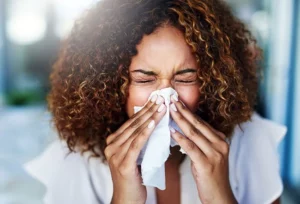Allergies are a common occurrence in the modern world, affecting millions of people of all ages and walks of life. They can be triggered by a wide range of substances, including foods, medications, and environmental factors such as pollen, mold, and pet dander.
While allergies can range in severity, they can often cause uncomfortable and even dangerous symptoms that can interfere with daily life. It is important for individuals to be aware of the signs and symptoms of allergies, as well as the various treatment options available to manage and alleviate them.
Symptoms of Allergies
Allergy symptoms can vary from person to person and may depend on the specific substance or allergen that is causing the reaction. However, there are some common symptoms that individuals may experience when suffering from an allergy. These include:
Sneezing
Itching of the eyes, nose, throat, or skin
Watery or red eyes
Runny nose
Stuffy nose
Coughing
Wheezing
Shortness of breath
Chest tightness
Rash or hives
Swelling of the face, lips, tongue, or throat
In some cases, individuals may experience more severe symptoms known as anaphylaxis, which can be life-threatening. These symptoms may include:
Difficulty breathing
Rapid or weak pulse
Chest pain
Swelling of the face, lips, tongue, or throat
Loss of consciousness
If you experience any of these symptoms, it is important to seek medical attention immediately.
Treatment for Allergies
There are several treatment options available for managing and relieving allergy symptoms. These options may include:
Allergy medications: Over-the-counter or prescription medications, such as antihistamines, decongestants, and nasal sprays, can help to relieve allergy symptoms.
Allergy shots: For individuals with severe allergies, allergy shots (also known as immunotherapy) may be an option. This treatment involves receiving small doses of the allergen in question, which helps to build up immunity and reduce the severity of allergic reactions.
Allergy-proofing your home: If allergies are triggered by environmental factors, such as mold or pet dander, taking steps to allergy-proof your home can help to reduce symptoms. This may involve removing carpets, using air purifiers, and washing bedding frequently.
Avoiding triggers: Avoiding exposure to the substance or allergen that triggers your allergies can be an effective way to prevent symptoms from occurring.
Natural remedies: Some individuals may find relief from allergy symptoms using natural remedies, such as herbs, essential oils, and dietary supplements. However, it is important to consult with a healthcare professional before using any of these remedies.
Conclusion
Allergies can cause a wide range of symptoms that can interfere with daily life. It is important for individuals to be aware of the signs and symptoms of allergies, as well as the various treatment options available to manage and alleviate them. If you experience severe allergy symptoms, it is important to seek medical attention immediately. By understanding your allergies and taking steps to manage them, you can improve your quality of life and reduce the risk of potentially dangerous reactions.

 Home
Home Health
Health Diet & Nutrition
Diet & Nutrition Living Well
Living Well More
More












